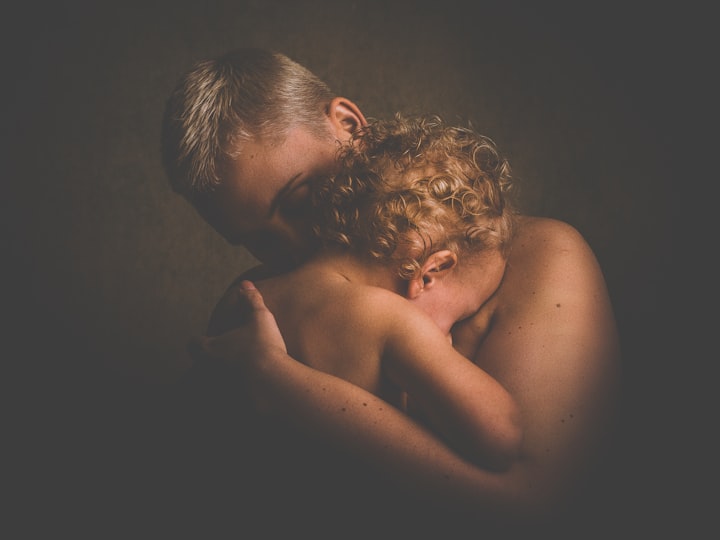The Abrupt Death of the Mother I Knew — and the Birth of the Woman Inside Her
For all of my teenage life, I hated her — until I saw her for who she was

The anger and resentment were boiling up inside me.
I was done with her bullshit. This wasn’t the first or second time she had publicly humiliated me.
It was more than what my teenage self could handle.
“I wish I didn’t have a mother like you.”
There…. I had said it.
My voice was dripping with venom. I aimed to hurt. I wanted her to feel my pain. I gloated for the next few seconds after the words left my mouth. I would have the last say and turn my back on her.
“You don’t know what all I have done for you,” came her quiet voice. I froze.
There was a slight crack in her usual loud voice. I could have sworn I saw her eyes glistening with tears for a moment before everything shut down and her emotionless facade was back in place.
My words had hurt, if only for a second. Contrary to my expectation, it didn’t feel like a win.
My mother had been normal once. Or so my dad and brother have told me. She would sing us lullabies and bake cake on our birthdays. I don’t remember that woman. All my early childhood memories of her are hazy.
The only memories of her in my head started from the time her mental health started declining.
At a very confusing age, I had to deal with a mother who would get violent, scream, shout, and throw stuff across the room.
At times, she wouldn’t speak for hours, staring blankly at the television screen which remained on to fill the deafening silence in the house. Once in a while, she would laugh hysterically, her eyes fixed on the telly. There was nothing funny playing on the screen, but she seemed to find the news of people getting killed hilarious. At random, she would burst out, saying something that made no sense to us. It looked like she was having her own conversations in her head. And maybe she was.
All I knew was she was going crazy. And it was spreading like poison through all our lives.
Other than her curious behaviors, she grew unusually protective of me. I could go nowhere except to school and tuition. Hanging out with friends involved a full day of arguments. Most of the time, I would give up and cancel on them. It was easier to avoid the confrontation and tell my friends I could not make it. Soon they stopped inviting me out.
In one of her fits, she made me quit dance classes because apparently, the teacher was a bitch. I had been practicing classical dance for over eight years under the same person. One fine day, it was over.
At fifteen, I was living with a mother who thought everyone was out to get her and a father who was in denial about his wife’s mental issues.
And nobody knew. My father forbade me from speaking about it to anyone, including my friends. Mental health issues translated to crazy, and that was a matter of shame in a brown household.
A quick search on the internet convinced me she was schizophrenic. We never got an official diagnosis.
At night, she wouldn’t sleep. She would lie awake, her paranoid thoughts overpowering her sane mind. Some nights, she would attack my sleeping father. He would go to work trying to cover the scratch marks on his face and arms. Her delusions got worse with time.
I spent my days drowning out the noise of my parents fighting. I remained in my self-created world — one I had created within the four walls of my room to escape the reality of my life. My self-preservation bubble.
I spent my time rebelling by talking to boys, lying about minor things, flunking exams, and faking signatures on report cards. From an above-average student, my academic level had dropped to attending after-school classes for failing students.
As the days went on, I became my mother’s prisoner and my father’s emotional crutch.
With the weight of it all, the bitterness grew. I resented her for not being normal. I was ashamed to introduce her as my mother. Why couldn’t she be like other mothers?
When I met my friend’s mother, jealousy burned in me. I craved the same affection from mine. I wanted her to be a friend, to guide me through the tumultuous period of my adolescence. But she was an empty shell.
It was clear she would never be the mother I desired.
I was the daughter of an unloving mother.
There was no saying what would trigger one of her episodes. She was a ticking bomb, and I had perfected the art of walking on eggshells around her.
This went on until I graduated from high school and moved to India to attend college.
Five years later, I was back in my mother’s clutches. But this time, things were slightly better.
In the few years I spent outside of my dysfunctional family environment, I had experienced immense freedom. I was no longer the teenager bearing the weight of her parent’s problems.
I had grown through friendships, mistakes, stepping out of comfort zones, love, and heartbreaks. And it seemed my mother had changed too.
My father had somehow got her to a psychiatrist. She was on medication. The little white tablet dictated the mood of our family.
If she took her meds, things were almost normal. If she missed it for a few days, the storm began once again.
It was during one of her brighter moods that I had the chance to really look at her.
A lot had changed. The year before, my dad had to go out of the country for work. She had slipped and fallen in the bathroom. Unable to get back up, she had to drag herself to the bedroom to call for help. For months, she remained under treatment. She had trouble walking, and I saw this whenever she hesitated to climb stairs or refused to go out without my father.
Those were the moments I truly saw her.
She was no longer the cruel, vindictive woman I had grown up with. The lady in front of me was frail and scared and needed help. During her happier moods, she would want to cuddle or go shopping. It almost felt like I had the mother I had so badly craved for earlier.
Those were the times when I could barely contain my guilt. While she cuddled me, the tears would threaten to fall.
My teenage self could not fathom my mother being anything else other than a mother. Someone who was required to sacrifice everything for their children. It was her duty, wasn’t it? Unconditional love and all.
When I didn’t receive that from her, I told myself she hated me. At a time when I knew nothing about regulating emotions, my mind formed stories, casting her as the villain.
At 25, I was a grown woman who saw her in a different light.
She was not just a mother but also a woman.
A woman who had to face her own struggles throughout life. She wasn’t happy. Maybe she wasn’t living the life she dreamt of as a young girl, or perhaps she wasn’t in love with my father anymore. I wouldn’t have known, I realized then. Because I knew nothing about who she was beyond her role as my mom.
She grew up in a culture where girls were taught to be obedient and demure, to live their lives serving their husbands and children. They were told that husbands had the right to beat their wives, that their voices did not belong outside the kitchen and that a lady’s highest honor was in sacrificing herself for the sake of family. She had travelled to a foreign land where she had no choice but to fully depend on my father and tried to raise her two children.
Maybe I had always been wrong.
My mind had always pushed the bad parts to the forefront. There had been times, even in the darkness, when her actions were not meant to hurt me.
Never in her violent episodes had she ever physically tried to hurt me as she did to my dad. Maybe being overprotective was her way of keeping me away from the unknown demons of her mind. Most of the time, she couldn’t remember what she had said or done. There was no way to tell.
If I had lived her life, would I be happy? I had to ask myself. My answer was a clear no.
How could she have loved another when she was not happy with herself? It was an impossible task. One that was expected of her because she was a mother.
She didn’t know about the concept of self-love or filling your cup first.
She was an unhappy woman dealing with a crippling illness while trying to live according to what culture and society had instructed her.
This tiny breakthrough did wonders for me.
Seeing the woman in her, I could finally forgive her and myself. I could forgive her for not being like other moms. I could forgive myself for what I said and did through my hurt. I could let go of the resentment I had held so close to my heart.
She was not just my mother. She was a person.
That was when the mother I wanted died, and the woman in her was born.
She was more than just a mom. She was someone who enjoyed new clothes and jewellry, someone who liked to travel, a person who loved to cuddle with her daughter.
Even with all her faults, this realization was enough to begin the healing of my mother wounds. I needed to let go of the mother I never had.
Maybe this is what we all must do. See our loved ones as a person first and not just as their role in our lives. Recognize that they could be struggling too. See them as flawed, beautiful humans on their personal journeys instead of tying them down to our expectations.
Just that one change of perception could bring more compassion and understanding to each one of us.
That would free us all.
About the Creator
Eshal Rose
Writer of thoughts.






Comments
There are no comments for this story
Be the first to respond and start the conversation.